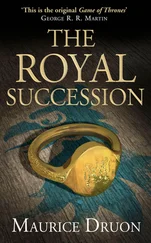‘Oh, poor people,’ she murmured.
She immediately ordered her following to give alms in her name to every patient, and that two hundred pounds should be given to the foundation.
‘But, Madam,’ Bouville, who was walking beside her, whispered, ‘we haven’t enough money to pay with.’
‘What does that matter? It’s better than buying chased drinking-cups or silks for dresses. I feel ashamed of such vanities; I even feel ashamed of my own health when I see so much misery.’
She brought Guccio a little reliquary which enclosed a minute piece of Saint John’s robe ‘with a visible stain of the Baptist’s blood’ which she had bought at a great price from a Jew who specialized in this particular business. The reliquary was suspended from a little gold chain which Guccio immediately hung round his neck.
‘Oh, dear Signor Guccio,’ said Princess Clémence. ‘I am so sorry to see you lying here. You have twice made a long journey so as to be, with Messire de Bouville, the messenger of good tidings; you were of great assistance to me at sea, and now you will not be present at the celebration of my wedding!’
The ward felt as hot as an oven. Outside a thunderstorm threatened. The Princess took a handkerchief from her bag and wiped away the sweat which shone upon the invalid’s face with so natural and gentle a gesture that Guccio’s eyes filled with tears.
‘But how did this happen to you?’ Clémence went on. ‘I saw nothing at the time and, indeed, do not yet know what occurred.’
‘I ... I thought, Madam, that you were about to disembark, and as the ship was still rolling, I ... I leapt forward wishing to give you my arm for support. It was growing dark and the light was bad and, there it is, my foot slipped.’
From then on he had to believe in the half-lie himself. He would so like it to have happened like that! And, after all, the sudden whim which had made him want to jump ashore first ...
‘Dear Signor Guccio,’ said Clémence, much moved. ‘I do hope you get well quickly. And come and tell me of it at the Court of France; my door will always be open to you as a friend.’
They gazed into each other’s eyes but with perfect innocence, because she was the daughter of a King and he the son of a Lombard. Had the circumstances of their birth been different, this man and this woman might have fallen in love.
They were never to see each other again, and yet their destinies were to be more strangely and tragically linked than any two destinies have ever been.
4 4. Portents of Disaster 5. The King Receives the Oriflamme 6. The Muddy Army 7. The Philtre 8. A Country Wedding Part Two: After Flanders, Artois 1. The Insurgents 2. The Countess of Poitiers 3. The Second Couple in the Kingdom 4. A Servant’s Friendship 5. The Fork and the Prie-dieu 6. Arbitration Part Three: The Time of the Comet 1. The New Master of Neauphle 2. Dame Eliabel’s Reception 3. The Midnight Marriage 4. The Comet 5. The Cardinal’s Spell 6. ‘I Assume Control of Artois’ 7. In the King’s Absence 8. The Monk is Dead 9. Mourning Comes to Vincennes 10. Tolomei Prays for the King 11. Who is to be Regent? Footnotes Historical Notes Author’s Acknowledgements By Maurice Druon Copyright About the Publisher
Portents of Disaster 4. Portents of Disaster 5. The King Receives the Oriflamme 6. The Muddy Army 7. The Philtre 8. A Country Wedding Part Two: After Flanders, Artois 1. The Insurgents 2. The Countess of Poitiers 3. The Second Couple in the Kingdom 4. A Servant’s Friendship 5. The Fork and the Prie-dieu 6. Arbitration Part Three: The Time of the Comet 1. The New Master of Neauphle 2. Dame Eliabel’s Reception 3. The Midnight Marriage 4. The Comet 5. The Cardinal’s Spell 6. ‘I Assume Control of Artois’ 7. In the King’s Absence 8. The Monk is Dead 9. Mourning Comes to Vincennes 10. Tolomei Prays for the King 11. Who is to be Regent? Footnotes Historical Notes Author’s Acknowledgements By Maurice Druon Copyright About the Publisher
THE FINE WEATHER WAS short-lived. The tempests, gales, rain, and hailstorms which that summer devastated the west of Europe, and which Princess Clémence had already suffered on her voyage, began again the day after the cavalcade’s departure. After staging first at Aix-en-Provence and then at the Château d’Orgon, they arrived at Avignon in pouring rain. The painted leather hood of the litter in which the Princess was carried poured water like a cathedral gargoyle. Were the fine new clothes to be spoilt so quickly, the trunks flooded with rain, and the silver-embroidered saddles of the Neapolitan gentlemen destroyed before they had even been admired by the people of France? Messire de Bouville had caught cold, which did not make things easier. Could one imagine anything more absurd than to catch cold in the middle of July? The poor man was coughing, spitting, and snivelling in the most horrible way. As he grew older, his health was becoming more delicate, unless it were that the Rhône valley and the neighbourhood of Avignon were peculiarly unlucky for him.
Hardly had the cavalcade installed itself in one of the palaces of the papal town than Monseigneur Jacques Duèze, 5Cardinal of the Curia, came to greet Clémence of Hungary with a large number of clergy in his train. This old and alchemistical prelate, who had been a candidate for the triple tiara for the last fifteen months, still preserved, in spite of his seventy years, his strangely youthful walk. He danced among the puddles beneath the pouring rain which had put out the torches his people carried before him.
Cardinal Duèze was the official candidate of the family of Anjou-Sicily. That Clémence should be marrying the King of France was clearly an advantage to him and strengthened his position. He counted upon the new Queen to support him in Paris, and thus to win over to him the votes he lacked among his French colleagues.
Agile as a deer, he dashed up the stairs, compelling the pages who were carrying his train to break into a run behind him. He was accompanied by Cardinal Orsini and the two Colonna Cardinals, who were equally devoted to the Neapolitan interest. They had some difficulty in keeping up with him.
Though his handkerchief was to his nose and his speech hoarse, Messire de Bouville resumed some of his ambassadorial dignity to receive these empurpled dignitaries.
‘Well, Monseigneur,’ he said to the Cardinal, treating him as an old acquaintance, ‘I see that it is easier to meet you when one is accompanying the niece of the King of Naples than when one comes to you on the orders of the King of France. It is no longer necessary to gallop across country in search of you.’
Bouville was in a position to permit himself such amiable teasing; the Cardinal had cost the French Treasury four thousand pounds. fn4
‘The fact is, Monseigneur,’ the Cardinal replied, ‘that Madame Marie of Hungary and her son, King Robert, have consistently done me the honour of giving me their pious confidence and the union of their family to the throne of France, by means of this fair Princess of high repute, is an answer to my prayers.’
Bouville heard once more that strange voice which was at once rapid, broken, smothered, and almost extinct, seeming to issue from some throat other than the Cardinal’s and to be directed at some third person. At the moment, what he had to say was addressed to Clémence, whom the Cardinal never quitted with his eyes.
‘Moreover, Messire Comte, circumstances have some-what changed,’ he went on, ‘and we no longer perceive the shade of Monseigneur de Marigny behind you, and he held power for a long time and seemed always ready to practise defenestration. Is it true that he was proved to be so dishonest in his accountancy that your young King, of whose charity of soul we are all aware, was unable to save him from just punishment?’
Читать дальше












